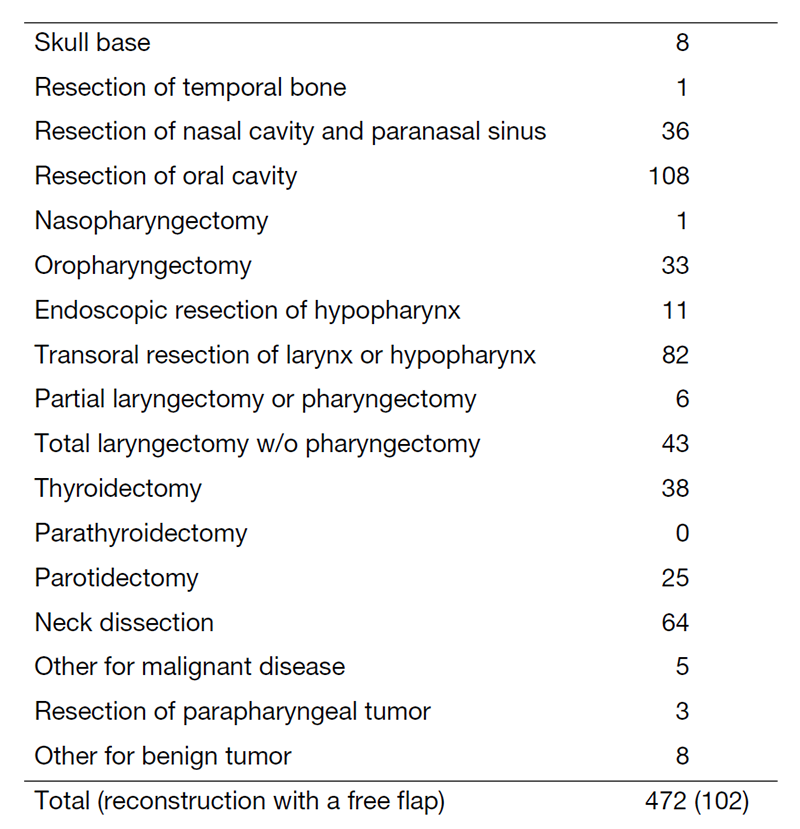Annual Report 2022
Department of Head and Neck Surgery
Seiichi Yoshimoto, Go Omura, Toshihiko Sakai, Yoshifumi Matsumoto, Azusa Sakai, Kohtaro Eguchi, Ko Miwa, Yusuke Aihara, Masatoshi Mukai, Takaaki Hayashi, Yo Suzuki, Takane Watanabe, Yuzo Abe
Introduction
The treatment strategy for head and neck cancer is to enhance survival rates while preserving the significant functions including speech, mastication, swallowing and cosmetic appearance. To achieve this strategy, our department has sought to select the best treatment modality and devise new surgical procedures based on clinical-pathological findings and our extensive database of patients with head and neck cancer.
Our department has developed and performed original surgical procedures for partial or subtotal laryngectomy for newly-diagnosed and radiation-failed laryngeal cancer, partial pharyngectomy for hypopharyngeal cancer and total glossectomy for advanced tongue cancer. These surgical approaches can be performed without sacrificing the larynx. Compared with conventional surgery, there are apparently fewer wound complications. Patients can resume social activities more easily when they maintain their ability to communicate orally.
The Team and What We Do
The Department of Head and Neck Surgery at NCCH consists of 13 head and neck surgeons. Many operations are performed under general and local anesthesia with or without microsurgical reconstructive surgery. In addition to radiotherapy, concurrent chemo-radiotherapy is performed with the Department of Radiation Oncology and the Department of Head and Neck, Esophageal Medical Oncology. We have many patients with extremely rare malignant diseases, such as head and neck sarcoma. There is therefore a need for greater collaboration with various departments and medical staff.
In 2022, 472 patients with head and neck tumors underwent surgery under general anesthesia, including 102 patients with major ablation and free-flap reconstructive surgery. Table 1 shows the number of surgical cases under general anesthesia.
Research Activities
We are performing translational research in collaboration with the Department of Pathology, the Department of Head and Neck, Esophageal Medical Oncology, and research institutes.

Clinical Trials
We are participating in a JCOG (Japanese Clinical Oncology Group) study on intra-arterial chemoradiotherapy for maxillary sinus cancer (JCOG1212) and a phase III study on END vs. watchful waiting for early tongue cancer (JCOG 1601). We are also participating in a phase III study to evaluate the efficacy of preoperative steroid for enhancing patient’s recovery after free tissue transfer reconstruction in collaboration with the National Cancer Center Hospital East Hospital and Miyagi Cancer Center, and a multicentric phase II study on minimally invasive surgery after induction chemotherapy for locally advanced HPV-positive oropharyngeal cancer. In addition, several global clinical trials on immune checkpoint inhibitors are ongoing in our hospital.
Education
We provide plenty of educational opportunities for resident doctors, with particular focus on acquiring operative techniques. They can learn everything about perioperative management, such as physical examination, image diagnosis, informed consent, preoperative preparation and postoperative management.
Future Prospects
While continuing function-preserving surgery, there will still be a need for extensive resection for advanced cases, including skull base surgery and salvage surgery. On the other hand, transoral robotic surgery will soon be introduced in our department. Treatment strategies for HPV-related oropharyngeal cancer will further be developed after obtaining the results from ongoing clinical trials. Immune checkpoint inhibitors are used for chemo-resistant patients with recurrent or metastatic tumors. We will obtain useful information on the response rate of these drugs for Japanese patients. Cases involving photoimmunotherapy will also be accumulated and its effectiveness evaluated.
List of papers published in 2022
Journal
1. Eguchi K, Omura G, Shimoi T, Kageyama D, Igaki H, Abe Y, Watanabe T, Aihara Y, Sakai A, Matsumoto Y, Sakai T, Yonemori K, Mori T, Yoshida A, Yoshimoto S. BCOR-CCNB3 sarcoma arising in the pharynx. Auris, nasus, larynx, 50:618-622, 2023
2. Omura G, Honma Y, Matsumoto Y, Shinozaki T, Itoyama M, Eguchi K, Sakai T, Yokoyama K, Watanabe T, Ohara A, Kato K, Yoshimoto S. Transnasal photoimmunotherapy with cetuximab sarotalocan sodium: Outcomes on the local recurrence of nasopharyngeal squamous cell carcinoma. Auris, nasus, larynx, 50:641-645, 2023
3. Omura G, Yoshimoto S, Rikitake R, Eguchi K, Nakamizo M, Nibu KI. Comparison of survival outcomes between adolescent and young adults and older adults with tongue squamous cell carcinoma: a nationwide database study using the head and neck cancer registry of Japan. International journal of clinical oncology, 28:221-228, 2023
